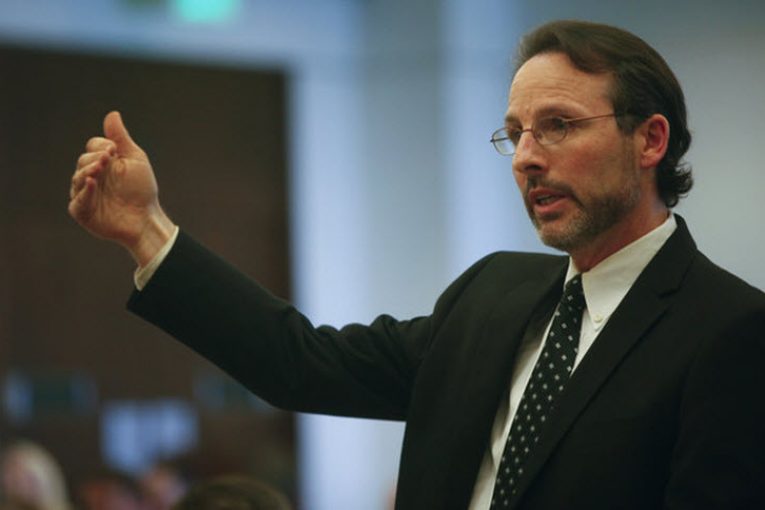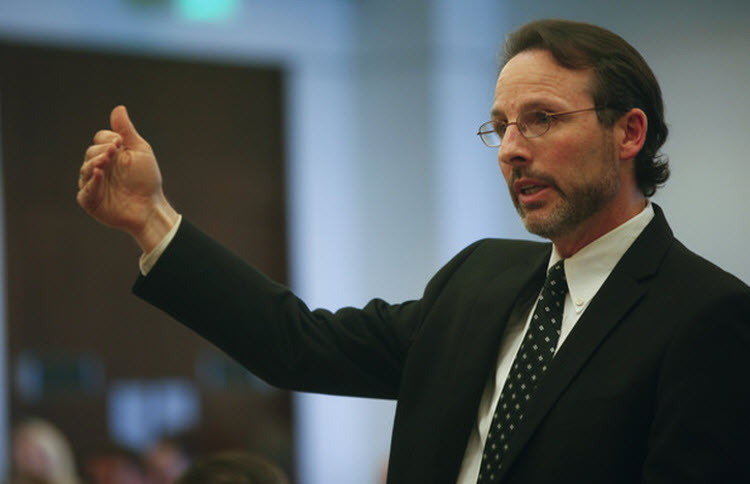

By David M. Greenwald
Executive Editor
Santa Ana, CA – Orange County Public Defender on Thursday filed a 400-page motion to dismiss for outrageous government conduct in the case against Paul Gentile Smith.
The motion alleges that prosecution team “concealing numerous items of evidence and producing false and misleading evidence in order to secure Paul Smith’s 2010 conviction for special circumstances murder” but then more remarkably carried out “a fourteen-year cover up of historic proportions.”
Sanders alleges, “The acts described below have irredeemably eroded Smith’s right to a fair re-trial, unfairly delayed Smith’s re-trial, and eviscerated any reasonable belief that all favorable and material evidence will ever be disclosed to this defendant. The only appropriate remedy is dismissal.”
At the center of this motion and these allegations are former Senior Assistant Orange County DA Ebrahim Baytieh, now a judge.
Sanders told the Vanguard, “What’s extraordinary about what occurred here is how far [Baytieh] was willing to go to keep this misconduct hidden.”
The allegations go well beyond the actions of Bahtieh, and Sanders in the motion names  numerous investigators and high ranking sheriff’s in the Orange County Sheriff’s Office who participate in what he alleges as a criminal conspiracy referring to the trial prosecutor and the law enforcement personnel that participated in the case investigation leading up to Smith’s 2010 conviction.
numerous investigators and high ranking sheriff’s in the Orange County Sheriff’s Office who participate in what he alleges as a criminal conspiracy referring to the trial prosecutor and the law enforcement personnel that participated in the case investigation leading up to Smith’s 2010 conviction.
“The problem is then once a prosecutor joins forces with his investigators to hide evidence from a defendant, it becomes disclosure disaster in the making,” he told the Vanguard. “Here [Baytieh] was required to turn over the misconduct committed by investigator in our case to every defendant who had one of these deceptive investigators on the witness stand. “
But Sanders charges, “For more than a decade he refused to do that and the result is nearly a hundred cases were infected with disclosure violations. Nearly half of defendant were facing murder charges.”
The Vanguard has covered the informant scandal for nearly a decade stemming from an early appearance Sanders made at a Vanguard event in 2014. Since that time, the scandal has exploded leading to cases being dismissed, the DA’s office recused, and the death penalty dropped against a mass shooter.
“The history of the role Baytieh played during the informant scandal is important,” Sanders explained. “He went to every event around this county telling people there was not a “shred of evidence” that prosecutors hid evidence. It turns out he was the worst violator by miles.”
Sanders added, “Those responsible for the concealment were not only were unmoved by the DOJ being on the ground in Orange County, but redoubled their efforts to conceal once the investigation was underway. The DOJ wrote about how bad this case was, but as we are now showing, so much more was hidden than they.”
Sanders alleges that the first phase of this misconduct directed against Smith, was carried out prior to the 2010 trial and conviction.
He alleges, “the prosecution withheld at least 15 items of evidence in violation of Brady v. Maryland,” but perhaps most significantly, “nearly all of these items were unearthed in the last two years—after the new trial was ordered. A number of items remain undisclosed.”
The concealed evidence includes undisclosed informants who questioned the defendant about the crime, an exculpatory recorded telephone call, and more.
The misconduct was aimed at preventing the defendant from realizing the extent of the violations of their rights.
Sanders then alleges that the prosecution team aimed to protect the verdict through widespread Brady violations in other cases.
The prosecution team is accused of violating their Brady obligations by failing to disclose evidence of the misconduct committed in the defendant’s case to other defendants.
“(N)one of the cheating would have been worth it to Baytieh if Smith ever realized the truth about what had been hidden in order to achieve his conviction,” Sanders writes in his motion.
Therefore, he charges, “well before Smith’s misled jury announced its verdict, Baytieh had already initiated the second phase of the misconduct: a cover-up designed to keep the conviction intact and protect team members from ever being held accountable.”
He adds, “Baytieh will soon be recognized as the principal architect of an evidence disclosure disaster unlike any other in this nation’s history.”
He writes, “(N)o other state or federal court has been confronted with a comparable quantity of cases infected with discovery violations stemming from a prosecutor’s attempts to cover up the wrongdoing committed in a single case.”
The motion identifies 98 cases in which the prosecution team violated their Brady obligations.
The failure to disclose evidence from the defendant’s case in other cases prevented defendants from impeaching the credibility of law enforcement witnesses and challenging the admissibility of jailhouse informant testimony.
“Among the more than eight dozen cases where Baytieh was responsible for
Brady violations are 45 where the defendant was charged with murder,” Sanders argues. “They include some of the most consequential cases in Orange County history.”
Sanders here references the infamous Dekraai case that was in many ways the start of the public disclosure of the informant scandal.
He argues, “if Baytieh had disclosed to Defendant Dekraai the truth about what occurred in Smith in terms of the hidden informant operation and the cover-up that followed, it would have made the entire jailhouse informant scandal unnecessary.”
The third phase of the misconduct represents a “conspiracy to systemically conceal the special handling log.”
Here the prosecution team is accused of conspiring to prevent defendants from obtaining Brady evidence from the Special Handling Log. The Special Prosecutions Unit, led by Baytieh, played a crucial role in systematically blocking the dissemination of evidence from the log.
The non-disclosure of evidence from the log has led to Brady violations in numerous unidentified cases.
“Baytieh feared the cover-up might be inadequate,” Sanders argues. “Therefore, in late 2016, after the Court of Appeal affirmed the recusal of the OCDA in Dekraai and the DOJ announced an investigation of constitutional violations related to the use of custodial informants, Baytieh initiated the third phase of the misconduct.”
Sanders alleges that Baytieh, seized “leadership role in a conspiracy with fellow prosecutors.”
He adds, “This conspiracy was created to prevent defendants from obtaining Brady evidence from the most important discovery of the jailhouse informant scandal: a long-hidden Special Handling Log (“SH Log”) of notes written by deputies who managed the jailhouse informant program.”
Sanders notes, “Entries in the SH Log both describe in shockingly clear language OCSD officers’ role in an operation designed to have Smith questioned in violation of the Sixth Amendment, and reference undisclosed interviews with informants Platt and Martin.”
In sum, Sanders continues, “this phase of Baytieh’s expansion of the cover-up—accomplished by systematically blocking the disclosure of evidence that could be used to impeach officers based upon their misconduct identified in the SH Log—has led to Brady violations in hundreds, if not thousands, of unidentified cases.”
The cover-up was so effective that even when the DOJ uncovered case-changing evidence in the Smith case, “the deception and concealment was far more aggravated than the department realized.”

